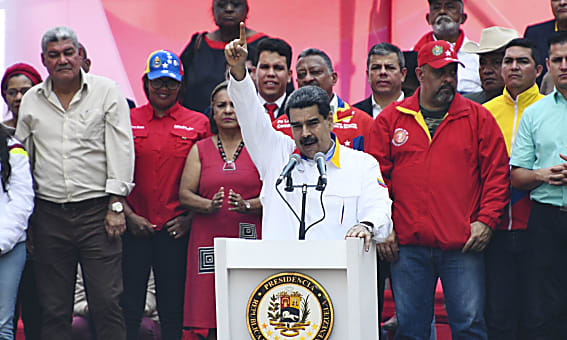
(Bloomberg) -- Despite scant progress in initial meetings, Norwegian officials have invited representatives of President Nicolas Maduro and his rival, Juan Guaido, to a second round of talks to defuse Venezuela’s crisis, according to lawmakers familiar with the conversations.
The sessions could occur in Oslo as soon as next week. But allies of Guaido, the head of the opposition-dominated legislature who says he’s Venezuela’s rightful leader, insist any dialogue is contingent on Maduro accepting proposals to hold a fresh presidential vote.
A multi-pronged diplomatic push to break Venezuela’s bitter stalemate kicked off last week, with a European Union mission visiting Caracas and envoys from Guaido and Maduro traveling to Oslo. But on both fronts, the government rebuffed calls to hold general elections, according to diplomats and lawmakers who spoke anonymously due to the sensitive nature of the conversations. Neither side has so far agreed to further talks, they said.
QuickTake: Why Venezuela Has Two Presidents, One Thorny Standoff
Norway’s Foreign Ministry and Venezuela’s Information Ministry declined to comment on the new opportunity to meet. Guaido, in a text message Wednesday said, “another invitation has not yet been finalized.”
For months, Maduro and Guaido have clashed, rallying followers to the streets and support from their allies abroad as runaway inflation, rampant shortages and crumbling infrastructure make daily life miserable for the masses. Guaido, recognized as head of state by the U.S. and over 50 other nations, is trying keep up pressure and turn cracks into canyons within the socialist regime. But despite record low approval and international isolation, Maduro has held tight to the levers of power with the help of still-loyal military forces and aid from countries like China and Russia.
Skepticism abounds within opposition ranks and among observers that the government will make significant concessions as demonstrations wane and many opponents go into hiding amid a renewed crackdown. Maduro has repeatedly called for talks, but after failed attempts by Venezuela’s neighbors and the Vatican to broker a solution, critics say the overtures are a mere ploy.
Battle Fatigue
Still, as international sanctions sink this former oil giant further into dysfunction, some see Venezuela’s factions slowly warming to negotiations to ease economic suffering.
“Barriers to success remain very high,” Eurasia Group analyst Risa Grais-Targow wrote in a research note to clients Monday. “As the crisis drags on, both sides may become more desperate to reach a solution that facilitates some advances.”
Mediation efforts have failed to make headway as tensions simmer. Representatives from the International Contact Group, an initiative comprising eight EU member states and four Latin American countries, met with both sides in Caracas after the opposition tried to spark a military uprising last month.
The ICG was formed this year to facilitate negotiations and has sporadically sent delegations to survey the depth of Venezuela’s collapse and talk to leaders.
Regime Roundup
Prior to last week’s visit, intelligence police arrested a close ally of Guaido, National Assembly Vice President Edgar Zambrano, sending many other top collaborators into exile or hiding. According to diplomats and lawmakers familiar with the discussions, visiting European officials were further discouraged when Maduro countered their proposals to hold general elections with a plan to bring forward next year’s legislative vote, effectively dissolving the current National Assembly.
Maja Kocijancic, an EU spokeswoman, didn’t immediately respond to an email requesting comment on the ICG’s next steps.
Guaido, 35, took the reins of the National Assembly in January and invoked a provision in the nation’s charter to launch an interim government in response to presidential elections last year that were widely viewed as a sham. The move, while largely symbolic, immediately won the backing of the U.S., which has since levied crushing sanctions on Venezuela’s all-important oil industry and urged allies to sever ties.
Early Elections
While Maduro’s allies virtually neutered the National Assembly in 2017, it is recognized by most Western countries as Venezuela’s only democratically elected body. Despite repeated threats, Maduro has stopped short of doing away with institution entirely, but on Monday he appeared to take a step closer.
“Let’s go to early National Assembly elections,” Maduro, 56, said at a rally in Caracas. “Let’s go to a peaceful, democratic, electoral, constitutional solution.”
In Oslo, mediators also met resistance to the idea of a fresh presidential vote. Delegations from the opposition and the government met with mediators separately and didn’t speak face to face. The discussions centered on the framework for a formal negotiation, including the composition of the groups, according to lawmakers familiar with the conversations.
If the next round occurs, Gerardo Blyde, a former mayor of a district in Caracas, former Transport Minister Fernando Martinez Mottola, National Assembly Vice President Stalin Gonzalez and former Electoral Council rector Vicente Diaz would represent Guaido, according to the lawmakers. Information Minister Jorge Rodriguez, Miranda state Governor Hector Rodriguez and Foreign Minister Jorge Arreaza would make up the government delegation, they said.
--With assistance from Jonas Bergman.
To contact the reporters on this story: Alex Vasquez in Caracas Office at avasquez45@bloomberg.net;Andrew Rosati in Caracas at arosati3@bloomberg.net
To contact the editors responsible for this story: Daniel Cancel at dcancel@bloomberg.net, Stephen Merelman
For more articles like this, please visit us at bloomberg.com
©2019 Bloomberg L.P.